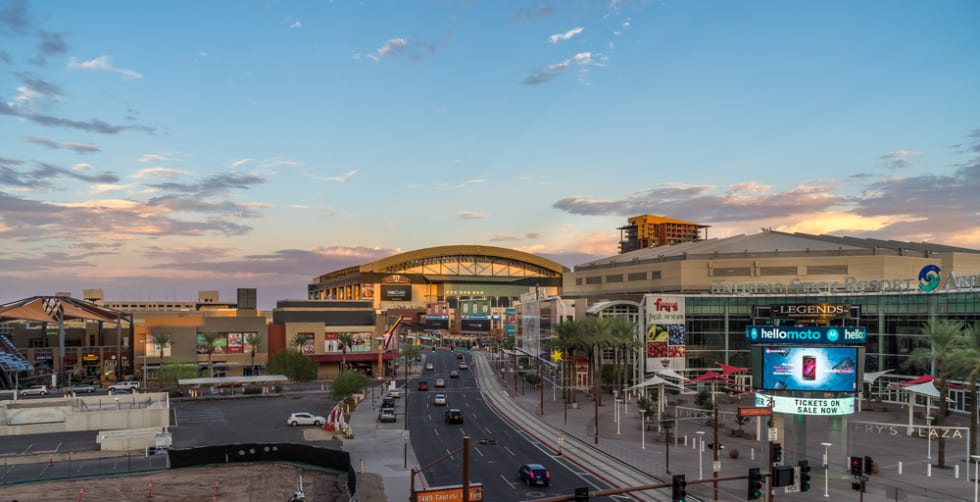- 39 units available
- Studio • 1 bed • 2 bed
- Amenities
In unit laundry, Patio / balcony, Granite counters, Hardwood floors, Dishwasher, Pet friendly + more

As of July 2025, living in Phoenix will cost you about 13% more than the national average—mostly thanks to rising rent and utility bills.
Sunshine, space to roam, and endless ways to stay busy—Phoenix isn’t short on perks. No wonder so many people are making the move to The Valley of the Sun. But before you dive headfirst into the desert heat, it’s worth asking: Can your budget keep up?
We’ve crunched the numbers so you don’t have to. This guide covers what it really costs to live in Phoenix right now—housing, utilities, and all the extras—so you can decide if the desert dream is doable.
When it comes to affordability, Phoenix has been historically affordable but is on the rise. It's not an exorbitantly expensive city compared to Los Angeles, but it's also not cheap anymore. Currently, the overall median rent across all apartments in Phoenix is $1,312 a month.
Data from Sperling’s Best Places shows that the average cost of living in Phoenix, AZ is 13% higher than the national average, and 6.2% higher than the state average.
Here's a breakdown of those cost of living categories:
| Cost of Living | Phoenix | Arizona | U.S. |
|---|---|---|---|
| Overall | 113 | 106.4 | 100 |
| Grocery | 97.3 | 96.1 | 100 |
| Health | 92.5 | 97.3 | 100 |
| Housing | 118.6 | 119.7 | 100 |
| Median Home Cost | $413,000 | $407,400 | $291,700 |
| Utilities | 101.8 | 102.7 | 100 |
| Transportation | 117.9 | 107.0 | 100 |
| Miscellaneous | 105.7 | 93.7 | 100 |
Of the major cities and neighborhoods around Phoenix, Scottsdale has among the highest cost of living. The average cost of living in Scottsdale is 13.0% higher than the national average and 6.2% higher than the state average.
| Cost of Living | Scottsdale | Arizona | U.S. |
|---|---|---|---|
| Overall | 113.0 | 106.4 | 100 |
| Grocery | 103.3 | 96.1 | 100 |
| Health | 92.5 | 97.3 | 100 |
| Housing | 230.9 | 119.7 | 100 |
| Median Home Cost | $721,200 | $407,400 | $338,100 |
| Utilities | 102.4 | 102.7 | 100 |
| Transportation | 109.2 | 107.0 | 100 |
| Miscellaneous | 105.9 | 93.7 | 100 |
Coolidge has the lowest cost of living in the Phoenix area. The average cost of living in Coolidge is 4.1% lower than the Arizona average and 2.0% lower than the U.S. average.
| Cost of Living | Coolidge | Arizona | U.S. |
|---|---|---|---|
| Overall | 102.0 | 106.4 | 100 |
| Grocery | 94.4 | 96.1 | 100 |
| Health | 100.4 | 97.3 | 100 |
| Housing | 72.4 | 119.7 | 100 |
| Median Home Cost | $285,700 | $407,400 | $338,100 |
| Utilities | 107.3 | 102.7 | 100 |
| Transportation | 90.2 | 107.0 | 100 |
| Miscellaneous | 93.4 | 93.7 | 100 |
According to our July 2025 Rent Report, the median rent in Phoenix sits at $1,312. That’s down 0.6% from last month and nearly 4% from this time last year—outpacing the national monthly dip of just 0.2%. Among the 100 biggest U.S. cities, Phoenix ranks #88 for rent growth, meaning prices here are cooling faster than most.
Even as the 69th most expensive large city, Phoenix rents are still below the national median. For context: the average rent across the country is $1,401, with one-bedrooms at $1,231 and two-bedrooms at $1,387. Phoenix? It’s right in line with spots like Columbus, OH ($1,314) and Arlington, TX ($1,303).
After looking at our Rent Report from July 2025, we found that the median rent in Phoenix is $1,124 for a one-bedroom apartment.
As of July 2025, the Phoenix median rent for a two-bedroom apartment is $1,340 per month.
If you hope to own your own home one day in Phoenix, you'll pay a median sales price of $413,000. Of course, it all depends on where you want to buy. Buying in Scottsdale or Paradise Valley will be much more expensive than in the city's sleepier suburbs.
The 50-30-20 rule of budgeting recommends earning at least three times your monthly rent. With the median rent for a one-bedroom in Phoenix at $1,124, you’d want to bring in about $3,372 a month before taxes—or roughly $40,460 a year.
So how does that stack up to local incomes? According to the U.S. Census Bureau, Phoenix’s median household income is $72,092—just under the national median of $75,149. That gives most renters some breathing room.
For a more bare-minimum benchmark, MIT’s Living Wage Calculator puts Phoenix’s living wage at $25.69/hour, or about $53,435 annually. That covers the essentials—rent, groceries, transit—but not much extra. The upside? The city’s median income still clears that bar, meaning many renters here can cover their needs and still have something left over.
According to data collected from MIT's Living Wage Calculator, a single Phoenix resident will spend $9,908 on transportation costs annually. For a family of four with two working adults and two children, that expense rises to $16,620 a year.
One of the biggest drawbacks to living in Phoenix is the lack of a comprehensive and robust public transportation system. While Phoenix does have a public transportation system consisting of both rails and buses, most residents rely on personal vehicles or ride-sharing to get around.
If you intend to rely solely on public transportation in Phoenix, Arizona, you'll be paying reasonable fares to get around. Valley Transport, the agency responsible for Phoenix metro transportation offers bus, light rail, and para-transit services.
A one-day pass costs $4 for basic bus service. Express/RAPID transit options are a bit quicker and have more straightforward routes. For a day pass, you'll spend $6.50 while special rural routes come in between $2.00-$4.00.

The average single adult in Phoenix will spend $4,080 on groceries yearly, assuming that all meals and snacks are cooked at home. For a family of four, with two adults and two children, these costs rise to $11,958, annually. Similarly, Numbeo reports that you'll spend about $80 on a three-course meal for two, not including tip.
If you are looking for inexpensive grocery options, Safeway and Costco are major grocers in the area that offer affordable prices on bulk buys. Membership at these stores can save you even more. Sprouts is another local grocery store that offers affordable prices on standard grocery items.
Healthcare costs are rising across the country. These high costs will follow you in your move to Phoenix. A single adult can expect to pay $2,810 for healthcare costs annually. For a four-person family, this amount rises to $10,067.
It’s important to find a healthcare plan that best meets the needs of you and your family. Luckily, you can shop and apply online for the right healthcare plan via Healthcare.gov. You can also head to Arizona’s state health insurance resource center for valuable resources on choosing the best healthcare plan.
That said, it’s common for employers to offer health insurance coverage. So, if you’re planning on relocating and have a job lined up, be sure to compare employer plans to other options to ensure that you get the best coverage and deals.
Despite the wild weather swings, utility costs in Phoenix are right in line with the national average. The typical monthly bill—covering electricity, gas, and water—lands around $251.67, compared to $240.57 nationwide.
| Location | Avg Electricity Cost | Avg Gas Cost | Avg Water Cost | Avg Fuel Cost | Avg Total Cost |
|---|---|---|---|---|---|
| Phoenix, AZ | 173.08 | 18.10 | 42.72 | 0.12 | 251.67 |
| Arizona | 165.30 | 23.59 | 41.60 | 0.44 | 249.01 |
| U.S. | 148.26 | 40.05 | 35.40 | 1.88 | 240.57 |
But here’s the thing: Phoenix heat is relentless. With summer temps regularly soaring past 100°F, A/C isn’t optional—it’s survival. Expect to tack on $60–$70 more per month during peak heat if you're blasting the air 24/7. Your best move? Look for an apartment with updated HVAC and energy-efficient appliances to keep those spikes in check.
Even with the daytime scorch, desert nights can cool down fast, meaning you may end up using heat, too. The result? Seasonal swings in your bill are the norm.
Then there’s the tech stuff. WiFi and cell service usually add about $155.15/month, bringing your all-in utility average to roughly $406.82/month. Garbage collection is usually included in rent, so most renters don’t have to budget for it.
If you’re raising little ones in Phoenix, child care isn’t just a line item—it’s a major monthly investment. For a family with two kids, child care costs average $23,440 a year, or about $1,953 a month.
Even for just one preschooler, you’re likely looking at around $1,142.86/month—and that’s before you factor in extras like enrollment fees, supplies, or backup care.
Phoenix isn’t the priciest city for child care, but these numbers still pack a punch. If you're planning a move or budgeting for a growing family, it's smart to explore options early—from in-home care and daycare centers to employer benefits or local subsidies that could help ease the load.

If you’re wondering what life looks like outside your apartment, good news—Phoenix has plenty to offer. Whether you’re sweating it out on a mountain trail, cheering courtside, or taking in desert views with your iced coffee in hand, there’s no shortage of ways to stay busy. Here’s a breakdown of Phoenix’s fitness and entertainment scene—and what it’ll cost to enjoy it.If you’re wondering what life looks like outside your apartment, good news—Phoenix has plenty to offer. Whether you’re sweating it out on a mountain trail, cheering courtside, or taking in desert views with your iced coffee in hand, there’s no shortage of ways to stay busy. Here’s a breakdown of Phoenix’s fitness and entertainment scene—and what it’ll cost to enjoy it.
Working out here doesn’t have to mean shelling out for a pricey gym. Phoenix is packed with free and low-cost ways to move your body—from hiking South Mountain to biking your neighborhood loop. Want something more structured? A standard gym membership runs around $37.42/month for a single adult.
The bottom line: whether you’re into spin classes or solo jogs at sunrise, Phoenix makes it easy to stay active without draining your budget.
Sports fan? You’re in the right place. Phoenix reps all four major leagues—NBA, WNBA, MLB, NFL, and NHL—plus plenty of college and minor league action. But like anywhere, being a fan can get spendy. Here’s what you can expect to pay for tickets:
Want the game-day vibe without the arena prices? Hit a local sports bar instead. You’ll skip the stadium markup and still get that sweet, shared victory energy with other fans.
Phoenix isn’t just sunshine and saguaros—it’s got serious arts cred, too. The city’s cultural scene has been picking up speed, with theaters, performance venues, and creative spaces popping up all over. Whether you’re into classical concerts or local creatives, Phoenix delivers.
Start with the Herberger Theater Center, a downtown favorite known for local performances and community events. It’s a great spot to catch a play—or give back by volunteering behind the scenes.
And if you’re looking for something more casual and community-driven, don’t miss First Friday Art Walks in the Roosevelt Row Arts District. On the first Friday of each month, galleries open their doors late, food trucks line the streets, and local artists showcase their work. It’s free, walkable, and packed with energy—the perfect night out without breaking the bank.
For a more elevated experience (think violins, tutus, and arias), Symphony Hall has you covered. It’s home to the Phoenix Symphony Orchestra, Ballet Arizona, and the Arizona Opera—all under one very grand roof.
Let’s be real—if you live in Phoenix and don’t take advantage of the outdoors, you’re missing out. The city’s desert landscape isn’t just easy on the eyes—it’s an open invitation to get moving.
South Mountain Park is a local favorite and for good reason. It spans a massive 16,000 acres with over 50 miles of trails to hike, bike, or just meander at your own pace. Head to Dobbins Lookout—the highest point you can reach by trail or car—for sweeping views of the valley. Bonus: it’s totally free.
Prefer something a little closer to the city? Papago Park mixes desert charm with urban access. It’s home to the Phoenix Zoo, where admission runs $39.95 for adults and $29.95 for kids, and the Desert Botanical Garden, which costs about $16.95. Whether you're exploring on your own or entertaining out-of-towners, it’s an easy way to spend the day outdoors without straying too far from home.

Taxes in Phoenix won’t make or break your budget, but they’re worth factoring in—especially if you're new to Arizona.
Starting with income tax, Arizona now has a flat rate of 2.5% for all taxpayers. Simple, straightforward, and lower than what you'd pay in most states with income tax.
Where things tick up is sales tax. In Phoenix, the combined state and local rate is 9.1%, which is definitely on the higher side. Whether you're furnishing your new place or upgrading your phone, that extra percentage adds up—so budget accordingly for bigger buys.
On the plus side, property taxes stay low. The average effective rate in Maricopa County is about 0.62%, well below the national average of 0.99%. If buying a home is in your future, that could help keep monthly costs more manageable.
In short: low income tax, higher sales tax, and renter-friendly property tax. Phoenix stays pretty balanced on the tax front—but it always pays to read the fine print.
Phoenix isn’t just hot in temperature—it’s heating up on the job front, too. As one of the fastest-growing metro areas in the country, the city has seen a steady climb in both employment opportunities and wages over the past few years.
Major industries here include healthcare, tech, finance, education, and manufacturing. Big names like Intel, American Express, Honeywell, and Banner Health all have a strong presence, giving job seekers a wide range of options—from corporate roles to skilled trades and everything in between.
The unemployment rate in Phoenix tends to stay below the national average, and wages have been slowly rising to match the area’s cost of living. Entry-level and remote-friendly roles are also on the rise, especially in customer service, tech support, and digital marketing.
If you’re job hunting, Phoenix offers a solid mix of stability and growth—with a lower barrier to entry than pricier markets like L.A. or San Francisco. And with more companies embracing hybrid and remote setups, living in Phoenix doesn’t mean limiting your options.
Thinking about making the move to Phoenix? We’ve got you. Whether you’re chasing sunshine, a fresh start, or just cheaper rent, we’ll help you find a place that fits your life—not just your budget.
Not sure where to start? Take our quick quiz to get matched with apartments that actually make sense for you—your lifestyle, your priorities, your must-haves. With us, you’ll spend five minutes and save 50 hours searching.
Living in Phoenix is relatively affordable compared to similar-sized metro cities. In Phoenix, rent averages $1,124 for a one-bedroom apartment. Transportation costs in Phoenix amount to $9,908 a year. Food costs $4,080 a year on average for a single resident of Phoenix.
The 50-30-20 rule suggests earning three times your monthly rent, so with Phoenix’s median one-bedroom rent at $1,124, you’d need about $40,460 a year. Luckily, the city’s median household income of $72,092 exceeds this comfortably. Even MIT’s Living Wage Calculator sets a basic living wage at $53,435 annually, which Phoenix’s median income also surpasses, giving most renters enough to cover essentials and more.
According to the U.S. Census, the population of Phoenix is 1,650,070.
Living in San Antonio, TX, is generally more affordable than Phoenix, AZ. San Antonio’s monthly cost of living is about $4,380, with a median one-bedroom rent of $1,221, while Phoenix’s rent is slightly lower at $1,124 but comes with a much higher overall monthly living expense of around $6,600. Despite Phoenix’s lower rent, the city’s higher costs in other areas make San Antonio the cheaper choice for most renters.
Yes—Tucson is more affordable than Phoenix, especially when it comes to rent. As of July 2025, the median rent for a one-bedroom in Tucson is $886 and $1,137 for a two-bedroom. In comparison, Phoenix renters pay about $1,124 for a one-bedroom and $1,340 for a two-bedroom, making Tucson the more budget-friendly option overall.
As of July 2025, Arizona's cost of living is 6.4% higher than the national average, whereas Florida's is 3.1% higher. This means that, on average, living expenses—including housing, groceries, and transportation—are more affordable in Florida than in Arizona. However, both states remain relatively budget-friendly compared to coastal regions like California or New York. It's important to note that costs can vary significantly within each state.




In unit laundry, Patio / balcony, Granite counters, Hardwood floors, Dishwasher, Pet friendly + more
In unit laundry, Patio / balcony, Hardwood floors, Dishwasher, Pet friendly, New construction + more